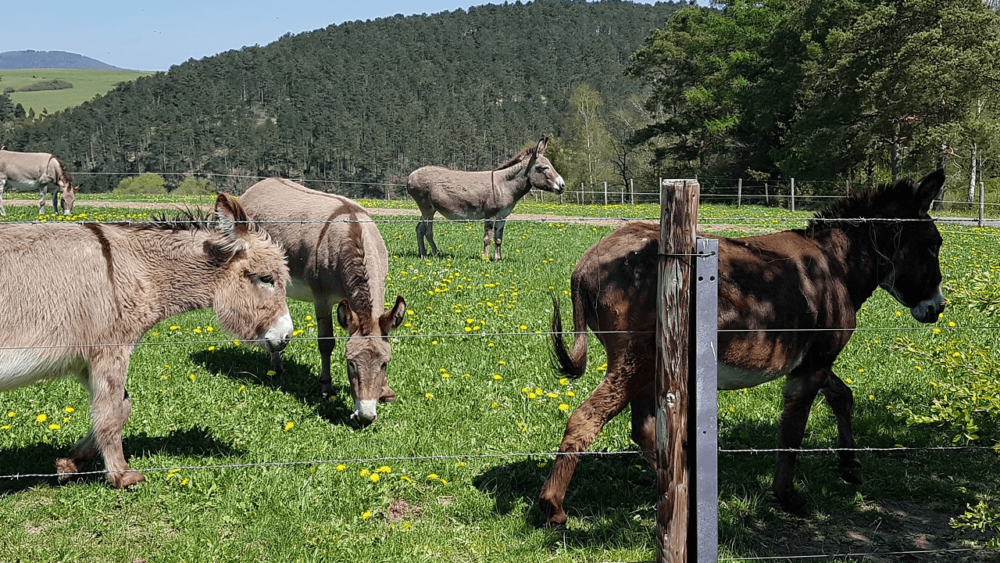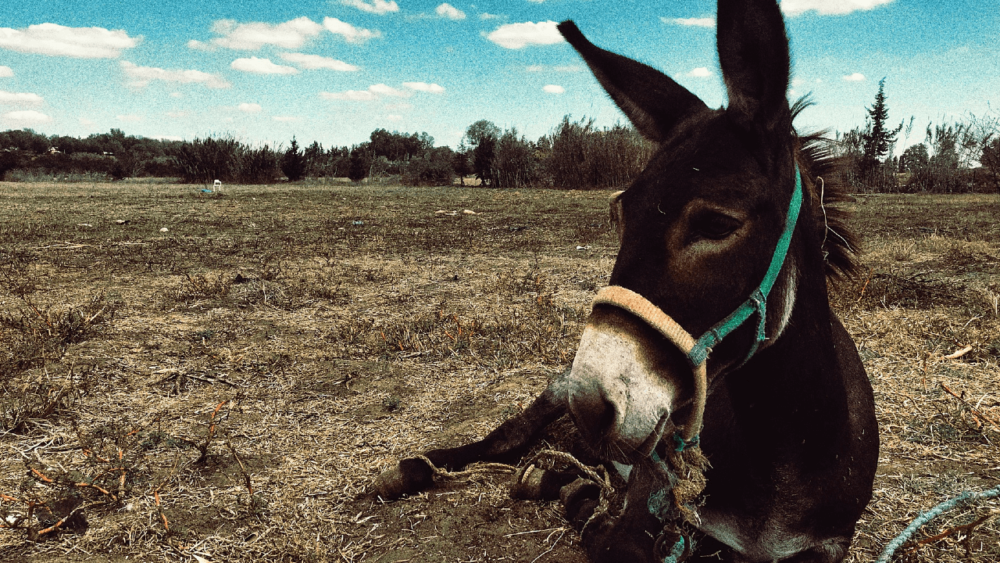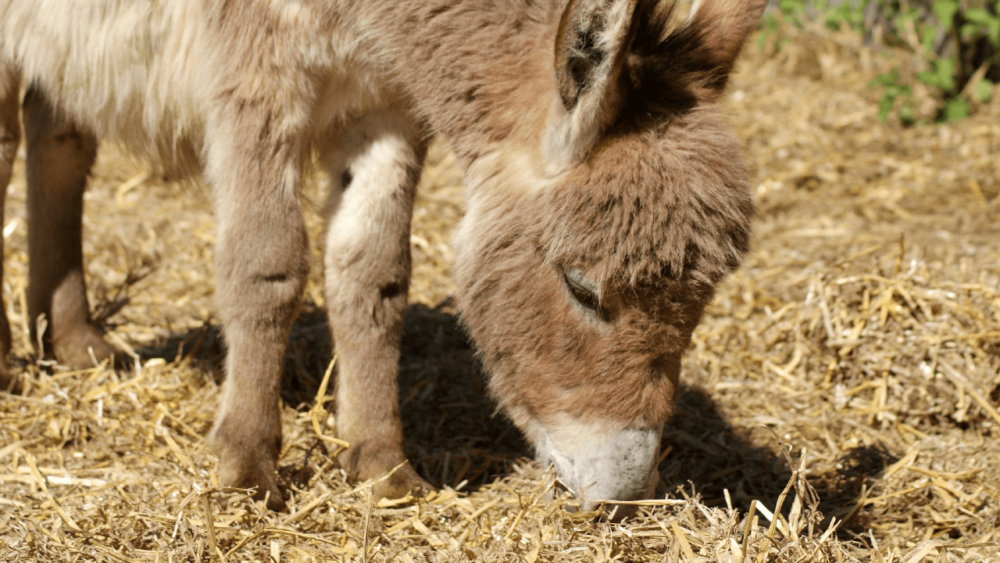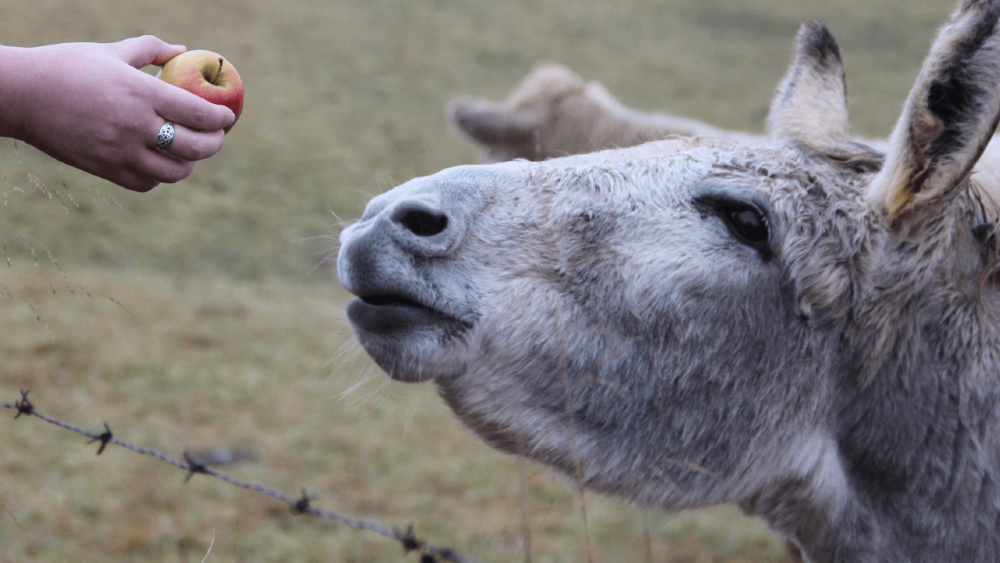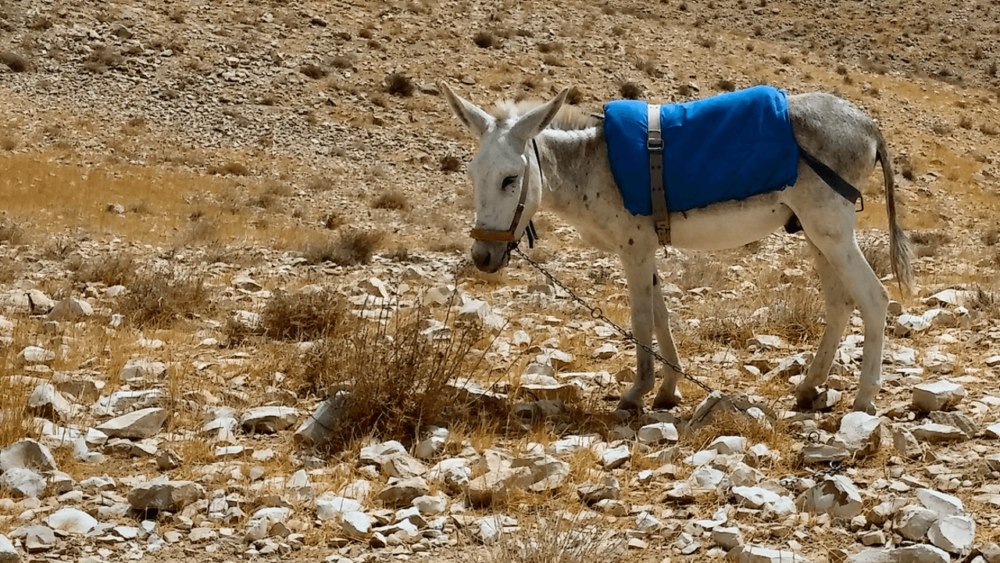Donkeys and horses share many similarities, but their nutritional requirements and digestion systems are very distinct. Donkeys and horses evolved in very different environments. When horses were already grazing the lush Great Plains of North America, the Wild African Ass was nibbling on shrubs and succulents in the arid African desert.
Donkeys have evolved to be highly adaptable feeders that can, and will, consume a variety of shrubs and grasses to gain the nutrition they need. Donkeys can also utilize more fibrous plant material more effectively than a horse. These traits make them notoriously “easy-keepers” that require less food and a lot less protein than a horse.
- High-Quality Barley Straw Is The Best Food For a Donkey
- The Best Hays and Grasses to Feed a Donkey
- Why Haylage Is Not Suitable for Donkeys
- How To Calculate A Donkey’s Daily Feed Requirements
- The Best Way to Supplement A Donkey’s Diet
- Healthy Treats Can Boost Your Donkey’s Immune System
- What You Should Never Feed a Miniature Donkey
- A Closer Look At The Donkey’s Digestive System
- Managing the Overweight Donkey
- 5 Golden Rules for Feeding your Donkey
- Conclusion
What is the best feed for donkeys? A combination of barley straw and hay is ideal for all donkey breeds. It gives your donkey all the fiber he needs without overloading him with protein and carbohydrates and increasing his risk of developing obesity, laminitis, or metabolic issues. Donkeys don’t do well on high-energy or high sugar hay, such as alfalfa.
High-Quality Barley Straw Is The Best Food For a Donkey
A by-product of the grain industry, straw comprises the dry stalks of cereal crops like barley, oats, and wheat. More commonly used as bedding than feed, research shows that the ideal forage for donkeys contains no more than 10% protein, 5% carbohydrates, and between 7 to 9MJ/kg of digestible energy (DE).
Barley straw fits this profile with 4 to 7% protein and 5-7 MJ/kg DE. Donkeys can happily munch on barley straw throughout the day without gaining weight. Therefore, a straw diet helps prevent weight-related health problems, such as laminitis and hyperlipaemia.
You can feed a donkey any straw, although the experts at The Donkey Sanctuary maintain that barley straw is by far the best. According to them, wheat straw is more fibrous and can be difficult for young donkeys or donkeys with dental problems to chew and digest effectively. On the other hand, oat straw is so easily digestible that it can cause significant weight gain.
With barley straw, donkeys can eat as much as they like without consuming too much energy. It keeps their bellies full and their digestive systems working effectively without exposing them to problems like gastric ulcers or obesity.
A diet of 75% barley straw and 25% forage is ideal during the summer. In the winter, 50% straw and 50% hay or haylage will help compensate for the lack of pasture available for foraging.
Donkeys also burn more energy in winter as they try to stay warm, so they may need supplementary feeding, especially if they’re working.
While horses consume around 3.1% of their body weight in dry food every day, donkeys eat just 1.5% of theirs. That equates to about 2 to 3 kg of fiber per day.
The Best Hays and Grasses to Feed a Donkey
Barley straw is more readily available as a pond treatment than a donkey feed in the USA. Timothy hay is a viable alternative as it has low protein levels and a higher percentage of indigestible fiber than other hays.
Other hays that are suitable for donkeys include:
- Bermuda – contains between 8.4% and 10% protein and 31.4% fiber
- Bluegrass – 5.6% to 9.1% protein, approximately 20% fibre
- Brome – 6.1% to 9.2% protein and 30% fibre
- Orchard -9.4% protein and 52% non-digestible fibre (NDF)
Mature hay from a second cut is better for donkeys than the protein-rich harvest of the first cut. More mature grass has a lower protein content and thicker stems. These factors make it less palatable and harder to digest.
Keep your donkey away from lush pastures and protein-rich hay varieties. Not only do these contain too much protein, but their sugar content is also dangerously high for a donkey’s digestive system.
Legume hays, like alfalfa and clover, contain as much as 33% protein, making them highly unsuitable for donkeys. Grasses like these are suitable only for pregnant or lactating jennies. In any other donkey, they will cause weight gain, which could cause liver problems, respiratory difficulties, joint pain, and laminitis.
Whatever type of hay you choose, it needs to be stored in a dry barn for at least three months before it’s suitable for feeding. Never feed your donkey freshly cut grass, as this can cause colic and laminitis.
Why Haylage Is Not Suitable for Donkeys
Haylage is almost identical to grass, except that it is has a higher moisture content. Haylage is excellent forage insofar as it is “dust-free, highly palatable, and nutritious.”
As soon as you open a bale of haylage, it will start to decompose, and fungus spores will form on the semi-dried forage. Any mold is potentially toxic to donkeys, so you only have a few days to use your haylage before it becomes dangerous to your donkey’s health.
Haylage is, therefore, better suited to someone with five or six donkeys to feed, rather than one or two.
Another problem with haylage is that its nutritional value is highly variable. Some types of haylage may be too high in energy and protein and too easily digestible for a donkey. Look for a commercially available “laminitis safe” equine haylage with low starch and sugar content to avoid these complications.
How To Calculate A Donkey’s Daily Feed Requirements
A donkey should eat between 1.5 and 1.8% of its body weight in dry matter every day. The table below gives you an idea of the weights and nutritional requirements of some of the best donkey breeds for riding.
| Breed | Average Weight | Daily Feed (Min) | Daily Feed (Max) |
| US Standard Donkey | 450 lb | 7 lb | 8 lb |
| Mammoth Donkey | 950 lb | 15 lb | 17 lb |
| Miniature Donkey | 325 lb | 5 lb | 6 lb |
The Best Way to Supplement A Donkey’s Diet
To thrive, donkeys need access to plenty of straw and forage, freshwater, and a salt lick. However, a donkey ration balancer can help balance out any nutritional deficiencies in the grazing and forage provided.
Unlike a horse, a donkey doesn’t need the high-quality protein element found in many equine balancers. A donkey-specific product like TopSpec’s Donkey Forage Balancer is a better option.
Developed with The Donkey Sanctuary, this ration balancer is low protein, low sugar and starch, and low calorie. It consists of amino acids, vitamins, minerals, yeasts, and prebiotics.
You may need to supplement a donkey’s diet more if:
- Your donkey is in his senior years
- It has dental problems
- It was previously malnourished
- It is recovering from an illness or injury
- She is pregnant or lactating
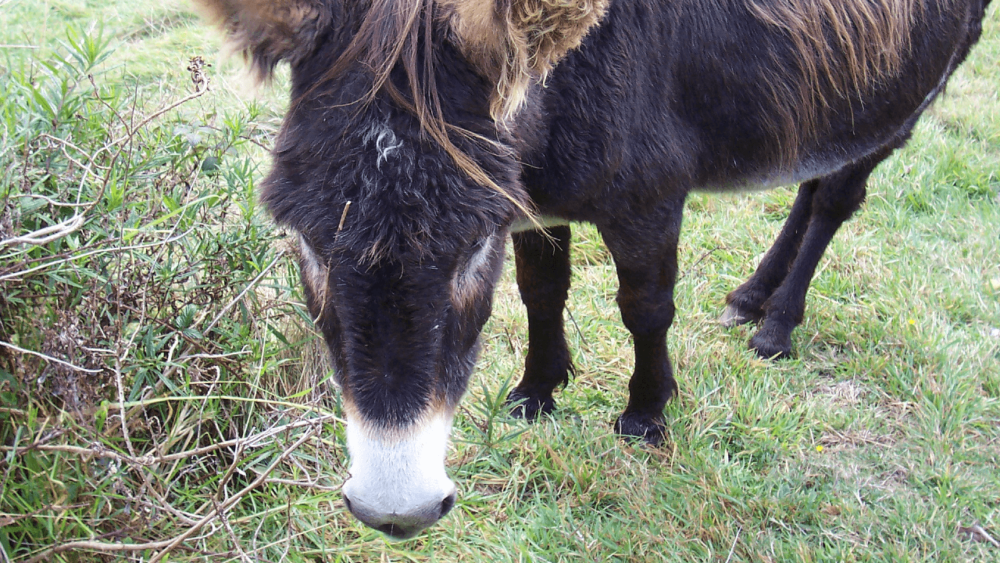
In such circumstances, look for either high-fiber pellets, like these, or if your donkey needs bulking up some beet pulp. You might even consider adding a handful of alfalfa to their hay ration every day to give them a valuable protein boost.
Healthy Treats Can Boost Your Donkey’s Immune System
In the wild, donkeys will consume almost any plant, from thorny shrub to herbaceous succulents. They’ll strip the bark from trees as eagerly as they’ll chew on a clump of grass. A donkey will, therefore, enjoy an environment where there is a rich diversity of plant life.
There are few plants that donkeys can’t eat. They also enjoy fruits and vegetables. An occasional piece of fruit can help boost your donkey’s immune system and provide the roughage he needs to keep his digestive system working. Vegetables are an excellent source of fiber, especially if you feed them with their peels still attached.
Here are a few ideas for healthy treats to offer your donkey:
- Apples
- Bananas
- Berries
- Carrots
- Pineapple
- Pumpkin
- Squash
- Turnips
Find out more about the donkey’s digestion system and what constitutes a healthy treat for your donkey in our article on What Foods can Donkeys eat?
What You Should Never Feed a Miniature Donkey
Even though donkeys eat a lot of different plant species, some are just as toxic to a donkey as they are to any other equid.
Red Maple, Black Walnut, and Oak have potentially fatal consequences, as do Japanese Yew and Oleander.
While horses might thrive on grains like oats, barley, and wheat, these are too rich for a donkey. The high sugar and starch content can cause obesity and other weight-related issues.
Starchy foods, like potatoes, are difficult for horses and donkeys to digest. The solanine in the potatoes makes them toxic to most equids, while the high starch content makes them extremely fattening. Feeding a donkey, potatoes will either cause obesity or severe gastrointestinal distress.
Potatoes belong to the nightshade family, along with eggplants, peppers, and tomatoes. These are toxic to donkeys and can cause long-term damage to the gastrointestinal tract, the consequences of which include a loss of appetite and difficulty absorbing nutrients effectively.
Never feed a miniature donkey, or any other breed, anything with mold on it. Fermented feeds, like silage, are also potentially toxic. It also has a high moisture level, is high in protein, and low in fiber, making it unsuitable for a donkey’s nutritional needs.
Other foods you should never feed a miniature donkey include:
- Leeks
- Cabbage
- Onions
- Garlic
- Pitted fruits like apricots and cherries
A Closer Look At The Donkey’s Digestive System
A donkey has much lower energy and protein requirements than horses do. Not only do they have a more efficient digestive system, but they also tend to expend less energy. The donkey can also recycle nitrogen, which occurs in the amino acids present in most protein sources.
While horses use their kidneys to excrete excess nitrogen in the form of urea, donkeys reabsorb it. They can reuse that nitrogen whenever they need to so, if the level of protein in their diet drops, they boost it using their internally regulated supplies.
This curious adaptation means that a healthy adult donkey needs just 3.8 to 7.4% protein in their diets, depending on their activity levels. Horses, on the other hand, need between 8 and 12%.
Donkeys are also more thirst tolerant than horses. While a horse will drop its nutritional intake if water is limited, donkeys “will maintain food intake even when deprived of water for long periods.”
Studies suggest that donkeys can decrease their resting metabolic rate to conserve water. By doing so, they can reduce their water requirements while maintaining their feed intake.
Managing the Overweight Donkey
With their low protein requirements and activity levels, domesticated donkeys are prone to obesity. It may be necessary to limit your donkey’s access to pasture, especially during the spring, to prevent him from putting on too much weight.
Donkeys with unlimited grazing are susceptible to obesity and may develop other complications like insulin resistance and laminitis.
As with horses, the first signs of obesity in a donkey include a fatty crest on the neck and fat deposits around the buttocks. Studies suggest that this accumulation of fat in the neck “could predispose donkeys to insulin regulation problems” as well as laminitis
Ideally, your donkey should be limited to a couple of hours of grazing a day and spend the rest of his time munching on barley straw in a bare paddock or sand exercise area.
A diet that consists primarily of straw, with plenty of fresh drinking water and a mineral lick or ration balancer, will help your donkey lose weight gradually and safely.
You should also limit the number of treats he gets and increase his straw ration while cutting back on the hay, which has a higher protein content.
You can also monitor his progress using a weight tape (Amazon) or body conditioning score.
5 Golden Rules for Feeding your Donkey
- Only feed your donkey good-quality feedstuffs
- Never feed a donkey moldy or tainted foods
- Donkeys prefer to browse all day, so make sure they have enough high-quality straw that they won’t try increasing their fiber intake by chewing on wood or stripping the bark from trees.
- Never feed your donkey commercial feeds designed for horses. These are too high in protein, sugar, and starch and will increase your donkey’s chances of putting on weight.
- Ensure your donkey has access to clean drinking water 24/7
My Favorite Equine Resources For Horses and Donkeys
This list contains affiliate products. Affiliate products do not cost more but helps to support BestFarmAnimals and our goal to provide farm animal owners with accurate and helpful information.
Squeaky Chicken Toy is hilarious to watch and the horses love it! It’s not super tough so keep it away from dogs.
Dewormer with Ivermectin: I use this for my horses and my goats. Duvet makes a great dewormer. I switch between the Ivermectin one and one like this one so the worms don’t get immune to it.
Manna Pro Apple Flavored Nuggets are a delicious smelling treat that my horses go crazy over.
Equinity Amino Acid Supplement for Horses makes a big difference for any horse that’s struggling with arthritis, hoof issues, or just generally. It’s great for older horses who can’t absorb all the nutrients in their food as well!
Manna Pro Weight Accelerator helps older horses gain weight and stay healthier! This was especially helpful when one of my older horses lost weight over the winter and helped her regain her weight over the summer!
Farnam Fly Control goes on the horse or donkey and will keep the flies off your sweet pet. It makes horses way more comfortable and will keep sores from getting infected as well.
Wound Kote protects sores and wounds. It acts as an antiseptic and helps wounds heal faster. It works on both my horses and goats.
Conclusion
The best feed for donkeys is high-quality barley straw, which should make up between 50% and 75% of your donkey’s diet, with hay forming the rest. You can boost your donkey’s immune system and fiber intake by offering him healthy fruits and vegetables, but don’t overdo it. Donkeys aren’t as active as horses and are even more prone to obesity.

